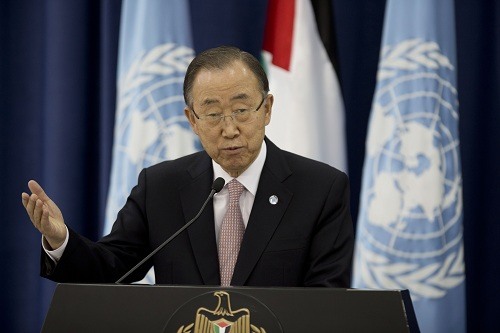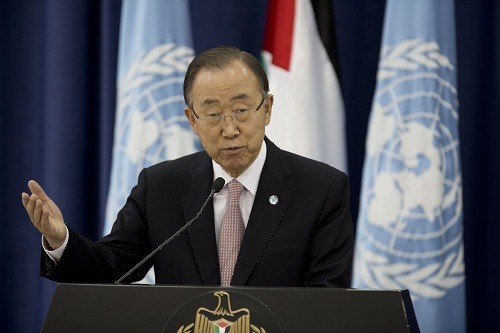 이미지 확대보기
이미지 확대보기때맞추어 영국의 저명 경제언론인 이코노미스트가 반기문 총장의 인물평을 보도했다.
이코노미스트는 최근 '남성·여성 아니면 실험쥐 중? (Master, mistress or mouse?)'라는 제목의 기사에서 "반기문 총장은 역대 사무총장들 가운데 가장 아둔하고 최악이란 평이다"라고 보도했다
이코노미스트는 이 보도에서 고통스렁루 정도로 끔찍할 정도로 눌변이었고 의전에 너무 집착했으며 임기응변을 모르고 깊이가 얕았다고 했다.
이 언론은 또 반기문 총장이 10년 동안 장수할 수 있었던 것은 우수한 능력과 자질을 갖췄기 때문이 아니라고 지적했다.
거부권을 가진 미국 영국 프랑스 중국 러시아등 5개 상임이사국이 반대할 특별한 이유가 없는 그저 그렇고 무난한 사람이었기 때문이라는 해석이다.
다음은 영국 이코노미스트지 기사 전문
Ban Ki-moon one of worst UN secretary generals
But he is painfully ineloquent, addicted to protocol and lacking in spontaneity and depth
Master, mistress or mouse?
Despite an unprecedented push to pick the UN’s next boss by open contest, the choice will probably be a stitch-up
May 21st 2016 | NEW YORK | From the print edition
Timekeeper
THE job of secretary-general to the UN is something of a poisoned chalice. The only one of its eight holders to date who is widely admired is Dag Hammarskjold, a Swede who died in an air crash in 1961, trying to end the first of post-independence Congo’s horrors. Kofi Annan, a shrewd and charming Ghanaian who held the post in 1997-2006, is seen as next best, despite patchy success in the world’s trouble spots. South Korea’s Ban Ki-moon, his outgoing successor (pictured above at the UN’s headquarters in New York), is viewed as the dullest—and among the worst.
In Mr Ban’s defence, he is decent and dogged. He can claim some credit for new development goals set last year and for overseeing a climate-change agreement in Paris in December. But he is painfully ineloquent, addicted to protocol and lacking in spontaneity and depth. Even after nine years in the job he is apt to stumble, most recently by calling Morocco’s presence in Western Sahara “an occupation”. Though most unbiased observers would agree, the diplomatic lapse gave the Moroccans an excuse to kick out UN staff trying to keep the peace in the area.
Overall Mr Ban personifies the defect to which the UN is prone: plumping for the lowest common denominator. He got the job because none of the permanent members of the Security Council—America, Britain, China, France and Russia—found him too objectionable. China wanted an Asian; America regarded him as broadly in its camp; Russia found him acceptably nondescript. It is an error the UN looks set to repeat when he steps down by the end of this year.
UN-watchers say there is almost a consensus that Mr Ban’s successor should be an eastern European woman—because no one satisfying either criterion has ever been chosen. Bulgaria has nominated Irina Bokova, the head of UNESCO, the UN’s cultural arm. But early in her career she was a loyal Muscovite Communist, so America may block her. If Bulgaria then names Kristalina Georgieva, the European Union’s budget commissioner, who may also fancy a shot, the Russians may block her because of the sanctions imposed by the EU on Russia over its actions in Ukraine.
At some point, presumably, a sufficiently inoffensive woman from the favoured region could be found. However, nine candidates (seven from eastern Europe, of whom three are women) have broken with precedent by declaring their candidacy rather than lobbying behind the scenes. In recent weeks they have all set out their stalls in public hearings before the UN General Assembly in New York.
Only two, both from outside eastern Europe, really impressed: Antonio Guterres, a former Portuguese prime minister who has run the UN’s commission for refugees deftly; and Helen Clark, a former prime minister of New Zealand who leads the UN’s development programme. The Americans are said to dislike Ms Clark for trying to curb their nuclear tests in the Pacific. The Russians may well shun them both. A few late runners may emerge. Kevin Rudd, a former Australian prime minister who speaks Chinese, wants to have a go, but is thinly supported. Susana Malcorra, a long-serving UN official who is Argentina’s foreign minister, may yet jump in. So conceivably could Michelle Bachelet, Chile’s president, who previously headed the UN’s agency for promoting women. Angela Merkel is speculated about wistfully, but most think that she would rather stay as Germany’s chancellor, however onerous the job has become.
Many ordinary members want the Big Five to give them two finalists to choose between, rather than a single name to be rubber-stamped. But that would require an elastic interpretation of the UN’s charter. At least the public hearings, which may resume if more candidates come forward, have probably knocked out the palpably implausible of the nine, ie, most of them.
The margins matter
No secretary-general could have ended, let alone prevented, all the many conflicts during Mr Ban’s tenure, such as the recent ones in Burundi and eastern Congo (see article). The UN can only be as effective as the warring parties or the big powers permit. But its boss matters because, for all its faults, the UN is the last resort when chaos breaks out. Though it has often failed to stop conflicts erupting, its secretary-general is often the only person who can call combatants to the negotiating table, and it is the sole entity with the capacity to pick up the pieces afterwards. It can make a difference only at the margin. But in some of the world’s most benighted places, that may be the margin between life and death.
The secretary-general is also the UN’s “chief administrative officer”. In this respect, too, under Mr Ban it has floundered. Anthony Banbury, a long-serving American UN official, penned a tale of woe in the New York Times soon after he had retired in disgust in March. It was failing, he wrote, “thanks to colossal mismanagement”. Budgets for peacekeeping and other missions, he complained, were sloppily drawn up and poorly supervised. The most obvious defect, he wrote, is a “sclerotic personnel system”, whereby “it takes on average 213 days to recruit someone”.
Hiring is often political rather than on merit. Informal regional quotas often entrench the incompetent and even the corrupt. In the Iraqi “oil for food” scandal, before Mr Ban’s era, several senior officials were either implicated in or failed to stop rampant graft. More recently peacekeepers in the Central African Republic sexually abused civilians they were supposed to protect. Countries such as the Democratic Republic of Congo, whose armies are notoriously prone to atrocities, were asked to contribute troops—for reasons of political expediency. A Swedish official in the UN’s human rights commission, Anders Kompass, was suspended (though later exonerated) for exposing sexual abuse by French soldiers after senior people refused to act.
The UN’s mode of governance is equally open to criticism. Countries that have grown in population, or economic or military heft, since it was founded in 1945, demand more of a voice—and not only when it comes to choosing a secretary-general. Many want to increase the number of permanent Security Council members. Brazil, Germany, India and Japan have hinted that they might, in return for admission, even at first forgo the right of veto that the Big Five hold. But each potential candidate has a rival. Pakistan cannot abide the notion of India being a permanent member. China is against Japan. Argentina and Mexico would block Brazil. Nigeria and South Africa would each howl if the other won a permanent seat for Africa. And why no permanent Arab member?
Despite the UN’s glaring faults, deplored ever more vociferously by its critics, most reforms are likely to be blocked. The Big Five are still prone to veto any dilution of their power. Poor countries do not want the administration streamlined or the budget squeezed: they do not pay for the UN and many see it as a gravy train which gives their people cushy jobs. As for a suggestion to strengthen the secretary-general’s independence by giving him or her only a single seven-year term rather than five-year stints with no term limits, as now, neither the Americans nor the Russians actually want someone strong or independent. The world needs a well-run UN, led by someone clever and tough, yet idealistic. Sadly, it probably will not get it.
김재희 기자 tiger8280@





























![[초점] 버핏 뒤잇는 아벨, 490조 원 자금으로 버크셔 미래 어떻게...](https://nimage.g-enews.com/phpwas/restmb_setimgmake.php?w=80&h=60&m=1&simg=2025050507094402253fbbec65dfb1161228193.jpg)












